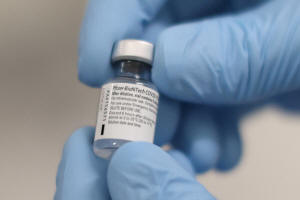UK warns people with serious allergies to avoid Pfizer vaccine after two
adverse reactions
 Send a link to a friend
Send a link to a friend
 [December 09, 2020]
By Alistair Smout [December 09, 2020]
By Alistair Smout
LONDON (Reuters) - Britain's medicine
regulator has advised that people with a history of significant allergic
reactions do not get Pfizer-BioNTech's COVID-19 vaccine after two people
reported adverse effects on the first day of rollout.
Britain began mass vaccinating its population on Tuesday in a global
drive that poses one of the biggest logistical challenges in peacetime
history, starting with the elderly and frontline workers
National Health Service medical director Stephen Powis said the advice
had been changed after two NHS workers reported anaphylactoid reactions
associated with receiving the vaccine.
"As is common with new vaccines the MHRA (regulator) have advised on a
precautionary basis that people with a significant history of allergic
reactions do not receive this vaccination, after two people with a
history of significant allergic reactions responded adversely
yesterday," Powis said.

"Both are recovering well.”
The MHRA said it would seek further information, and Pfizer and BioNTech
said they were supporting the MHRA's investigation.
The Medicines and Healthcare products Regulatory Agency (MHRA) was the
first in the world to approve the vaccine, developed by Germany's
BioNTech and Pfizer, last week, while the U.S. Food and Drug
Administration (FDA) and European Medicines Agency (EMA) continue to
assess the data.
"Last evening, we were looking at two case reports of allergic
reactions. We know from the very extensive clinical trials that this
wasn't a feature," MHRA Chief Executive June Raine told lawmakers.
[to top of second column]
|

A vial of the Pfizer/BioNTech COVID-19 vaccine is seen ahead of
being administered at the Royal Victoria Hospital in Belfast,
Northern Ireland December 8, 2020. Liam McBurney/Pool via REUTERS

Pfizer has said people with a history of severe adverse allergic
reactions were excluded from their late stage trials.
The FDA released documents on Tuesday in preparation for an advisory
committee meeting on Thursday, saying the Pfizer vaccine's efficacy
and safety data met its expectations for authorization.
That briefing document said 0.63% of people in the vaccine group and
0.51% in the placebo group reported possible allergic reactions in
trials, which Peter Openshaw, Professor of Experimental Medicine at
Imperial College London, said was a very small number.
"The fact that we know so soon about these two allergic reactions
and that the regulator has acted on this to issue precautionary
advice shows that this monitoring system is working well," he said.
(Reporting by Alistair Smout; additional reporting by Josephine
Mason, Ludwig Burger and Patricia Weiss, Editing by Paul Sandle and
Alexandra Hudson)
[© 2020 Thomson Reuters. All rights
reserved.] Copyright 2020 Reuters. All rights reserved. This material may not be published,
broadcast, rewritten or redistributed.
Thompson Reuters is solely responsible for this content.
 |